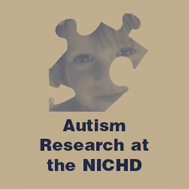Thin Bones Seen in Boys With Autism and Autism Spectrum Disorder
by
Barbara Kram, Editor | January 30, 2008

Autism Research
at the NICHD
Results of an early study suggest that dairy-free diets and unconventional food preferences could put boys with autism and autism spectrum disorder (ASD) at higher than normal risk for thinner, less dense bones when compared to a group of boys the same age who do not have autism.
The study, by researchers from the National Institutes of Health and Cincinnati Children's Hospital Medical Center, was published online in the Journal of Autism and Developmental Disorders.
The researchers believe that boys with autism and ASD are at risk for poor bone development for a number of reasons. These factors are lack of exercise, a reluctance to eat a varied diet, lack of vitamin D, digestive problems, and diets that exclude casein, a protein found in milk and milk products. Dairy products provide a significant source of calcium and vitamin D. Casein-free diets are a controversial treatment thought by some to lessen the symptoms of autism.
Funding for the study was provided by the NIH's National Institute of Child Health and Human Development and National Center for Research Resources. The research team that conducted the study was led by Mary L. Hediger, Ph.D., a biological anthropologist in NICHD's Division of Epidemiology, Statistics and Prevention Research.
"Our results suggest that children with autism and autism spectrum disorder may be at risk for calcium and vitamin D deficiencies," Dr. Hediger said. "Parents of these children may wish to include a dietitian in their children's health care team, to ensure that they receive a balanced diet."
Dr. Hediger stressed that the current study results need to be confirmed by larger studies. Until definitive information is available, however, it would be prudent for parents of children with autism and ASD to include a dietitian in their care, particularly if the children's diets do not include dairy products or they are not otherwise eating a balanced diet, she said.
Because girls are much less likely to have autism or ASD than are boys, the researchers were unable to enroll a sufficient number of girls within the short time frame of the study to allow them to draw firm conclusions. Dr. Hediger added that if a girl with autism or ASD is not eating diary products or eating a balanced diet, it would be prudent for a dietitian to be included in her health care team.
Autism is a complex brain disorder involving communication and social difficulties as well as repetitive behavior or narrow interests. Autism is often grouped with similar disorders, which are often referred to collectively as autism spectrum disorders. The underlying causes of autism and ASD are unclear. There is no cure for the disorders and treatments are limited.
